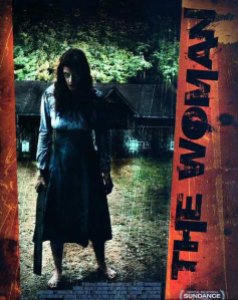“The Woman character is sort of what we as people come from…something closer to our animal selves.”
 Cult aficionados and strange little boys and girls need no introduction to the work of Lucky McKee. The writer/director of 2002’s cult hit May, Lucky McKee is the purest of filmmakers – a truly fascinating voice, a champion for the lone wolf, the misfit, the weird, the outsider and the homicidal!
Cult aficionados and strange little boys and girls need no introduction to the work of Lucky McKee. The writer/director of 2002’s cult hit May, Lucky McKee is the purest of filmmakers – a truly fascinating voice, a champion for the lone wolf, the misfit, the weird, the outsider and the homicidal!
Now he is back, and working with ‘The Scariest Man in American’ Jack Ketchum, for the brutal final act of The Dead River series: The Woman. They have delivered a profound and punishing story of the pain, secrets and corruption which lurks behind the smiling portrait of a normal family.
McKee talks to me about working with Ketchum, his own feelings on the negative/positive reactions to The Woman, what fuels his obsessions and some of his favourite outsider characters in fiction.
The Woman is the concluding chapter in Jack Ketchum’s The Dead River series. This time around you co-wrote it. When did Ketchum approach you about a collaboration and was working on a pre-established mythology something which you found tough or liberating?
LM: Well, first off, I loved the first two novels. They are really intense pieces of work. Ketchum takes the time to set up his characters as living breathing people before the mayhem takes place. I identify with that approach. I was approached by Ketchum and Andrew van den Houten to pitch an idea for a sequel to Offspring once it was finished. They both really liked the idea and Ketchum and I decided to write the novel and script together. It was a fantastic process. I would say it was way on the liberating side.
The film doesn’t deviate much from the book – was Ketchum a consultant at all times during filming, and how did the process of writing together compare to making the film?
LM: We really stuck to the story. There were some surface changes, made here and there, just to compensate for the resources we had. I also think the film isn’t quite as overt as the novel. In my opinion, with film, a little goes a long way. So I tried to be very strategic with the way I handled the rough stuff. I think if you just go all out the whole time, that stuff loses its impact on the audience. Ketchum was there for almost the entire shoot. He usually only visits a set for a day or two, but I think on this one, once he started seeing results, he just couldn’t leave. It was invaluable to have him there to bounce ideas off of.
Chris Cleek is so quotidian and ordinarily evil. I love that you explore the horror and secrets that lurk behind the smiles of a family portrait. What draws you to this material and fuels your obsessions?
LM: I’m fascinated with the Devil Has a Handsome Face concept. I was very inspired by Hitchcock’s film Shadow of Doubt when figuring out the tone of The Woman. I guess what fuelled my obsession with this story was to have two characters in violent contrast. The Woman character is sort of what we as people come from…something closer to our animal selves. Cleek is all cleaned up and civilised – a man of the law – but all of that control he exerts in his life has corrupted him on the inside. That was very interesting to explore.
The Woman has already won awards and generated a buzz in both print and online publications. What are your thoughts on some of the negative/positive responses to the film so far?
LM: To me, it’s all good. I would much rather someone hate my film than be in the middle of the road about it. But honestly, this is the most warmly received film I have made since the start of my career. It has been a dream.
In all your films you have consistently represented the voice of the outsider. How difficult was it to explore these dark corners?
LM: Well, it helps to be an outsider myself.
Who are some of your favourite outsider characters in both literature and film?
LM: Travis Bickle [Taxi Driver] and Karl Childers [Sling Blade] are favourites. Carrie is pretty fuckin’ radical too.
 What are the most difficult obstacles to overcome for filmmakers today?
What are the most difficult obstacles to overcome for filmmakers today?
LM: The most difficult obstacle here in the States is to get the chance to do something pure. Very few filmmakers have that luxury.
Are there any other contemporary horror novelists you’d like to collaborate with or another literary/cinematic mythology you’d like to work on?
LM: I’d like to work with Ketchum again. Other than that, I have some projects with some peers of mine and some original stuff I’ve been holding in my pocket for quite some time.
What are you working on next?
LM: I can’t say!
In your opinion, what is the perfect film?
LM: Anything that gets me so involved that I lose myself in it. The best films are experienced, not watched.
ALAN KELLY









